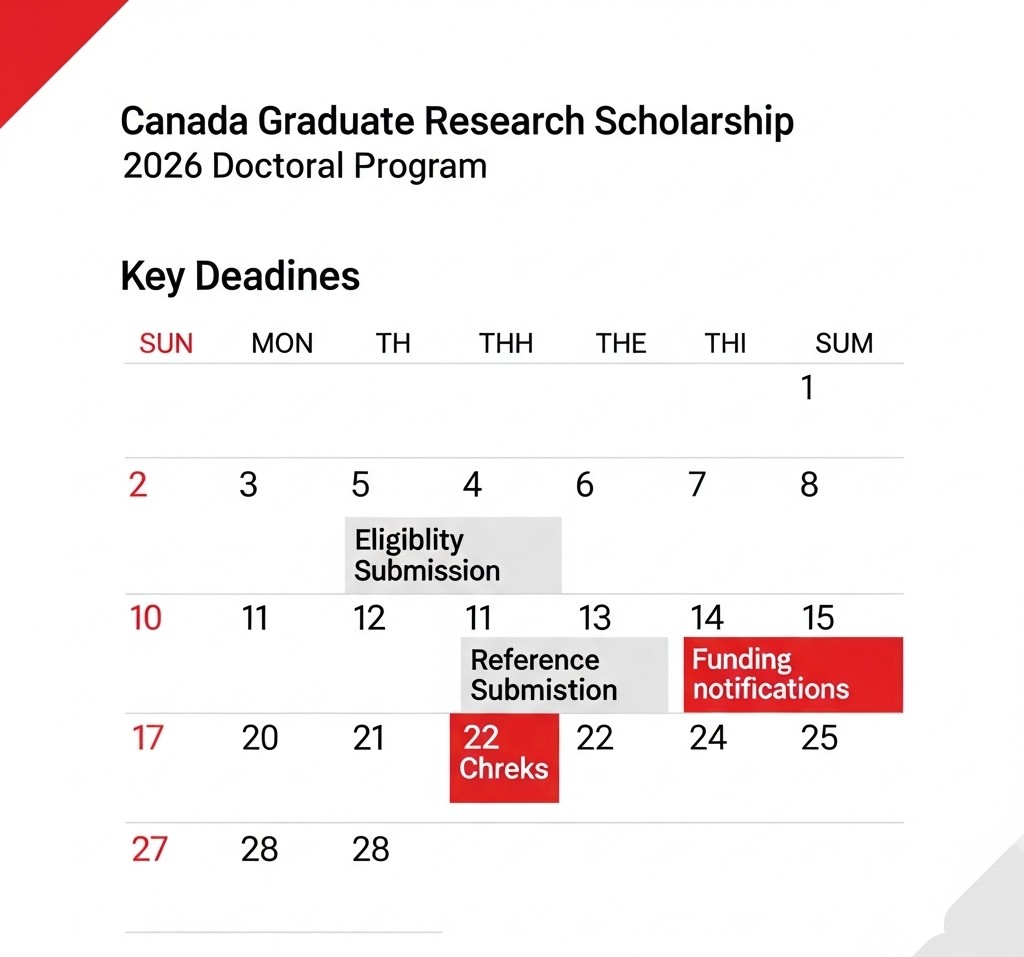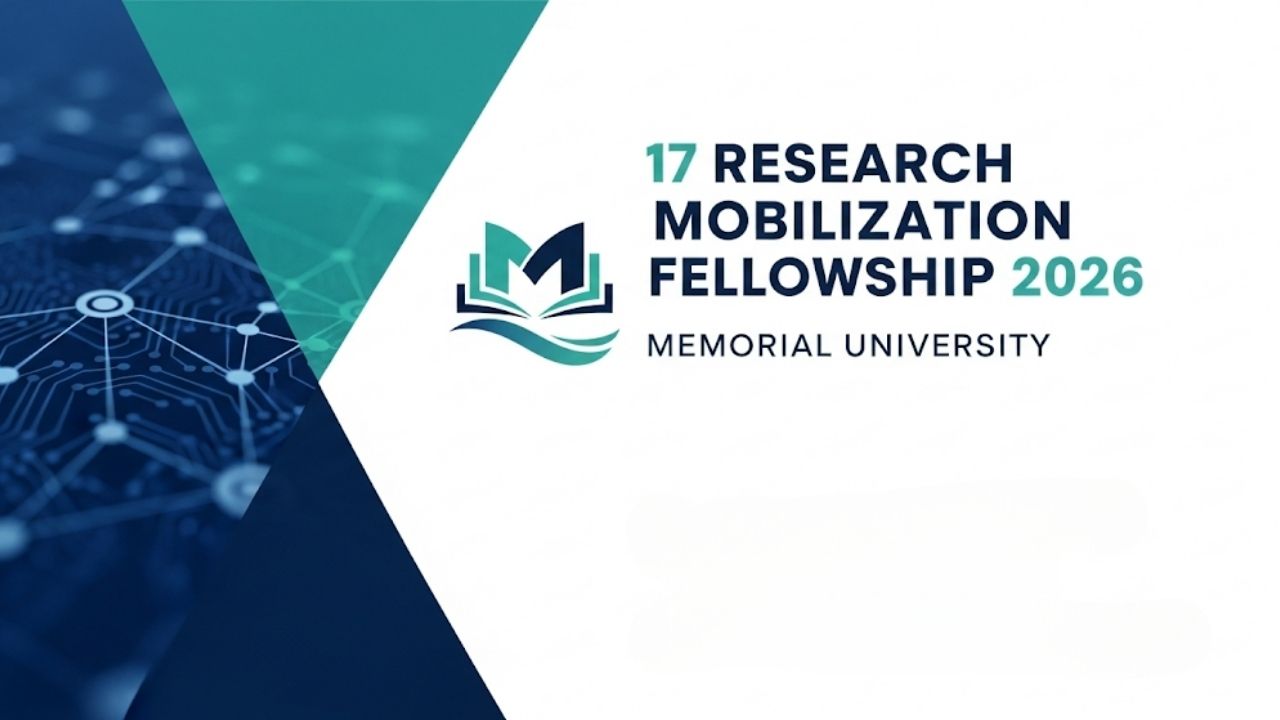Embarking on a doctoral journey is an exhilarating pursuit, a commitment to pushing the boundaries of knowledge and contributing meaningfully to your field. For many aspiring researchers, the financial aspect can seem daunting. This is where the Canada Graduate Research Scholarship (CGRS) 2026 for Doctoral program steps in, offering a transformative opportunity to fund your ambitious research in Canada. As someone who has spent years guiding students through the labyrinth of scholarship applications, I understand the mix of excitement and apprehension you might feel. This guide is designed to empower you with comprehensive, actionable insights, helping you navigate the CGRS application process with confidence and clarity, making your doctoral dreams a tangible reality.

Your Path to a Funded PhD: Understanding the CGRS Doctoral Program
The Canada Graduate Research Scholarship (CGRS) – Doctoral (CGRS D) program is a prestigious award designed to recognize and support the next generation of outstanding innovators, knowledge workers, creative thinkers, and researchers. It has replaced the former Canada Graduate Scholarships – Doctoral (CGS D) and the NSERC Postgraduate Scholarships – Doctoral (PGS D) programs, harmonizing the federal research funding landscape for doctoral students. This support allows scholars to concentrate more fully on their doctoral studies, seek out the best research mentors, and contribute significantly to the Canadian research ecosystem.
Canada Graduate Research Scholarship (CGRS) 2026
| Key Fact | Detail/Statistic |
| Value | Up to $40,000 per year |
| Duration | Up to 36 months (3 years) |
| Eligibility (Citizenship) | Canadian citizens, permanent residents, and international students |
| Eligibility (Study Progress) | No more than 36 months of full-time equivalent study in the doctoral program by December 31st of the application year |
| Application Method | Through a Canadian institution or directly to the agency, depending on registration status |
The Canada Graduate Research Scholarship 2026 for Doctoral program is an exceptional opportunity for aspiring doctoral researchers. While the application process demands diligence and strategic thinking, the rewards are immense. By focusing on your academic strengths, meticulously crafting your research proposal, and adhering to deadlines, you significantly enhance your chances of success. This scholarship isn’t just about funding; it’s about investing in your potential to make groundbreaking contributions to your field and to the world. Start preparing your application now, and take the definitive step towards a transformative doctoral experience in Canada.NSERC Website.
Demystifying Eligibility: Are You a Fit for the CGRS 2026?
Understanding the eligibility criteria is the first, crucial step. The CGRS Doctoral program aims to attract top talent, both domestically and internationally.
General Eligibility Requirements
- Citizenship and Residency: You must be a Canadian citizen, a permanent resident of Canada, or a protected person under subsection 95(2) of the Immigration and Refugee Protection Act (Canada) as of the application deadline. International applicants are also eligible if they are enrolled in their doctoral program of study at an eligible Canadian institution by the application deadline, with up to 15% of awards available to them.
- Program of Study: Your doctoral program must be predominantly research-oriented, culminating in a thesis, major research project, dissertation, scholarly publication, performance, recital, and/or exhibit that undergoes merit/expert review at the institutional level. Joint programs with professional degrees (e.g., MD/PhD) and clinically oriented programs (including clinical psychology) are eligible if they have a significant autonomous research component.
- Study Progress: You must have completed no more than 36 months of full-time equivalent study in the doctoral program (or the PhD portion of a joint program) for which you are seeking funding by December 31st of the calendar year of your application. This includes summer months. Two terms of part-time study count as one term of full-time study.
- Previous Awards: Generally, you cannot concurrently hold another CIHR, NSERC, or SSHRC award for doctoral studies, with some exceptions like the Michael Smith Foreign Studies supplement.
Where to Apply: Institutional vs. Direct Applications
- Through a Canadian Institution: If you are currently registered in a degree program at a Canadian institution with a doctoral award quota for the selected agency (CIHR, NSERC, or SSHRC), or if you were registered at any other time during the calendar year of application in such a program, you must apply through that institution.
- Directly to the Appropriate Agency: If you are currently registered at a foreign institution or a Canadian institution without a doctoral award quota, or if you were not registered at any time during the calendar year of application in a degree program at a Canadian institution with a doctoral award quota, you must apply directly to the appropriate agency.
Crafting a Winning Application for the Canada Graduate Research Scholarship (CGRS) 2026
Securing a CGRS Doctoral Scholarship is highly competitive, and a meticulously prepared application is key. I’ve observed that successful applicants consistently pay close attention to every detail, ensuring their application tells a compelling story of their academic excellence and research potential.
Components of a Strong Application
- Academic Excellence: This is a cornerstone of your application. The review committee will scrutinize your academic record, including transcripts, the duration of your previous studies, program requirements, courses pursued, course load, and your relative standing in your program (if available). High grades are important, but so is demonstrating a consistent and challenging academic trajectory.
- Research Proposal: This is arguably the most critical part of your application for the CGRS Doctoral program. Your proposal needs to be:
- Specific, Focused, and Feasible: Clearly articulate your research question(s) and objectives.
- Methodologically Sound: Describe your proposed methodology in detail, demonstrating its appropriateness for your research questions.
- Significant and Original: Highlight the expected contributions of your research to the advancement of knowledge in your field and its broader impact. What makes your project innovative? How will it add new knowledge?
- Written by You: While your supervisor will offer guidance, the proposal should be in your voice, showcasing your critical thinking and research capabilities. Avoid jargon where possible, or explain it clearly for a broad, interdisciplinary review committee.
- Concise: Adhere strictly to word limits. Every sentence should serve a purpose.
- Research Potential: This goes beyond your proposal. It encompasses your past research history, your demonstrated interest in discovery, and any contributions you’ve made to research and development (e.g., publications, presentations, conference attendance). Discuss the relevance of your work experience and academic training to your proposed research.
- Personal Characteristics and Interpersonal Skills: While less weighted than academic excellence and research potential (often around 20%), these are still important. This criterion is demonstrated by your past professional and relevant extracurricular interactions and collaborations. Think about leadership roles, teamwork experiences, and communication skills.
- Referees’ Reports: Your referees’ letters are vital. Choose individuals who know you well and can speak specifically to your academic abilities, research potential, and personal qualities. Provide them with ample time and all necessary information (your CV, research proposal, and a summary of the scholarship’s criteria) to write strong, detailed letters.

Tips for a Standout Application
- Start Early: The application process is extensive and requires significant time and effort. Give yourself at least a month, ideally more, to gather documents, refine your proposal, and coordinate with referees.
- Read the Instructions Carefully: This might seem obvious, but it’s astonishing how many applications are weakened by not following instructions precisely. Each agency (CIHR, NSERC, SSHRC) has specific guidelines; familiarize yourself with the one relevant to your field.
- Proofread, Proofread, Proofread: Typos and grammatical errors detract from your professionalism and credibility. Have multiple people review your application, including someone unfamiliar with your specific research area, to ensure clarity.
- Tailor Your Application: Do not use a generic application. Each CGRS Doctoral application should be specifically tailored to the scholarship’s criteria and the nuances of your chosen research.
- Be Authentic: Let your passion for your research shine through. The committee wants to see genuine curiosity and dedication.
Key Dates and Deadlines (Tentative for 2026)
While official dates for the Canada Graduate Research Scholarship 2026 for Doctoral program will be confirmed closer to the competition launch, based on past cycles, here’s what you can generally expect:
- Application Platform Opens: Early September (for the 2025-2026 competition, it opened early September 2024).
- Institutional Deadlines: Typically in September or early October of the year prior to the award tenure (e.g., for 2026 awards, institutional deadlines might be in Sept/Oct 2025). This gives institutions time to review and forward applications.
- Agency Deadlines (for direct applications): Often in mid-October (e.g., October 17th for the 2025-2026 cycle).
- Notification of Results: Offers typically become available in the Research Portal starting April 1st of the following year. Alternate offers may be extended until January 31st of the next calendar year.

It is your responsibility to regularly check the Research Portal for results. I’ve often advised students to set calendar reminders for all key dates, and to check official agency websites (CIHR, NSERC, SSHRC) for the most up-to-date information.
The Impact of the CGRS: Beyond Financial Support
The Canada Graduate Research Scholarship 2026 for Doctoral program offers more than just financial relief. It’s a testament to your potential, a stamp of approval that significantly enhances your academic and professional profile. Recipients often report:
- Enhanced Research Focus: The substantial funding allows you to dedicate more time to your studies and research, leading to deeper engagement and potentially faster completion of your degree.12
- Networking Opportunities: Being a CGRS scholar connects you to a network of high-achieving peers and established researchers across Canada.
- Career Advancement: The prestige of the scholarship is a valuable addition to your CV, signaling to future employers and collaborators your research capabilities and commitment to excellence. Past evaluations have shown that CGS recipients are more likely to be employed in positions closely related to their degree programs and tend to earn more.
Heidelberg University Extends Hans-Peter Wild Talent Scholarships: Deadline to August 15, 2025
Camargo Fellowship Residencies 2026 in France: A Global Call for Artists, Scholars, and Thinkers
Cambridge Trust Studentships 2025: Empowering Future Leaders
FAQ
Q1: What is the difference between the CGRS Doctoral and Vanier CGS?
A: The Canada Graduate Research Scholarship – Doctoral (CGRS D) is the new harmonized program replacing previous tri-agency doctoral scholarships like CGS D and NSERC PGS D. The Vanier Canada Graduate Scholarships program, which offered $50,000 per year, is no longer accepting new applications as of 2025. The CGRS D program is now the primary federal doctoral scholarship.
Q2: Can I apply for the CGRS Doctoral if I have already started my PhD?
A: Yes, you can. However, there are restrictions based on the number of months you have completed in your doctoral program by December 31st of the application year. Generally, you must have completed no more than 36 months of full-time equivalent study. Always check the specific guidelines on the relevant agency’s website (CIHR, NSERC, or SSHRC).
Q3: How important are my grades for the CGRS Doctoral program?
A: Academic excellence, as demonstrated by your transcripts and academic record, is a significant selection criterion, often weighted highly (e.g., 50%). While there isn’t a strict “A- average” requirement as in some previous programs, a strong academic standing is crucial.










